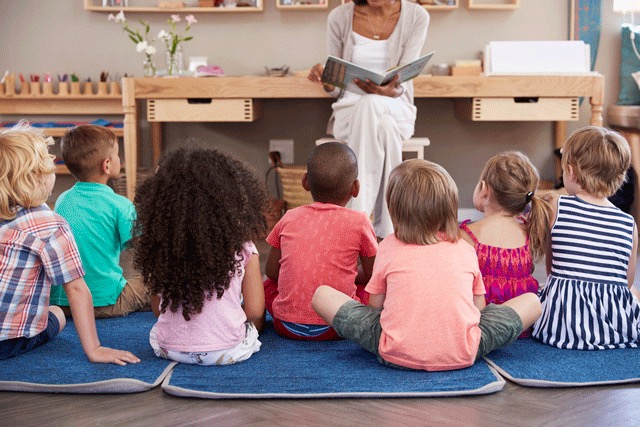Story reading and retelling the story is one important way for young DLL children to develop strong language and literacy skills. Teachers, parents, grandparents, and caregivers can use stories to build DLL’s heritage language skills. As young children are exposed to two languages simultaneously (e.g., Spanish and English), interactive story reading can enhance language learning in both languages.
Interactive reading can be done with an adult at school, home, waiting for appointments, and outdoors. The child sits with an adult, who reads a book to the child. The book may be a printed book or an e-book. The child provides comments about the story or pictures and the adult answers the child. Adults may ask a simple question such as “Who is knocking at the door?” or make a simple comment such as “That girl is very happy.” The back and forth exchange expands the child’s language skills and enhances attention to the story.
Choosing books that are interesting to the child will help engage her in interactive story reading. Books that honor the same cultural background as the child validate her home language and culture. It is important for children to see story characters who look like them and their family. When children are familiar with the story, the adults can have the child retell the story during rereadings to further build language skills.
Having children hold the book (or media device) and retell a story is an excellent way to expand language skills. Adults can ask the child questions such as “What happens next?” or “Where does the boy finds his dog?” to help the child retell a familiar story. Young children love to hear the same stories read repeatedly. Repeated reading helps young DLLs as they pick up new literacy skills (sequencing, memory, sounds of words) in both their home language and English.
There are a number of websites to help teachers, parents, and caregivers find culturally and linguistically diverse stories for young children (e.g., Book Lists, Books for Kids, Lee and Low Books). Your local public library (Illinois Public Libraries) is an excellent source for books and materials to guide young DLLs as they acquire literacy skills in their home language and English.

Bernie Laumann
Dr. Bernadette M. Laumann was the coordinator of the Illinois Early Learning Project from 2013 to 2019. She has been a child care teacher, an early childhood special education teacher, director of an inclusive early childhood program, researcher, and university teacher educator. Her research interests include mentoring and induction activities for beginning teachers and the use of technology in connecting evidence-based practice.
Biography current as of 2019
IEL Resources
- Resource Lists:
Web Resources
-
Book Lists
Source: Scholastic
This website shows collections of children’s books organized by topic.
-
Books for Kids
(also in Spanish)Source: Colorin Colorado
These booklists for children celebrate a wide range of cultures, languages, and experiences. They are perfect for read-alouds and bedtime stories, as well as for author studies!
-
Illinois Public Libraries
Source: Public Libraries
This page contains a list of public libraries in Illinois.
-
Lee and Low Books
Source: Lee & Low Books
Lee & Low Books is the largest multicultural children’s book publisher in the United States.


